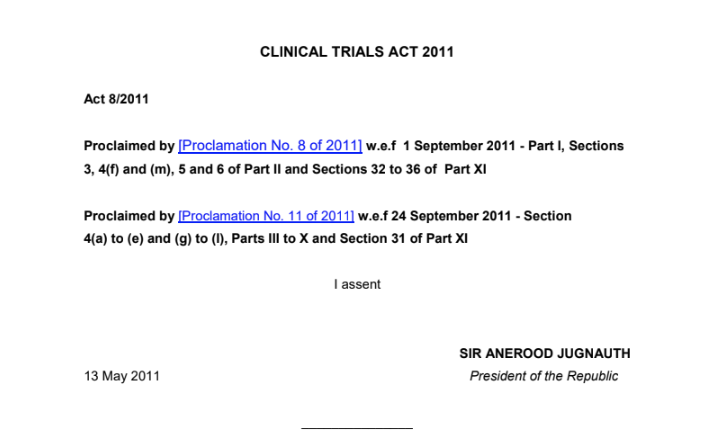Fill out the form below to receive the complete PDF guide directly in your inbox. This resource provides clear, step-by-step guidance to help you make the most of the information we’ve prepared for you.
Mauritius
CLINICAL TRIALS ACT 2011
The Act serves as the legal framework to regulate clinical trials in Mauritius. It mandates that no trial can be conducted without a Trial Licence granted by the Clinical Research Regulatory Council. The Act establishes three key governing bodies: the Council, the Ethics Committee, and the Pharmacovigilance Committee. It requires sponsors to be strictly liable for injuries or death resulting from the trial. The legislation enforces Good Clinical Practice (GCP) principles and sets explicit requirements for safety reporting, investigator suitability, and insurance coverage.

Use Cases
- Sponsors – Obtain Regulatory Authorization: They must make a written application to the Council for a Trial Licence and provide a protocol, investigator’s brochure, and certified copies of insurance for subjects.
- Investigators – Ensure Ethical and Scientific Conduct: They must be suitably qualified medical practitioners or health professionals , and adhere to the Good Clinical Practice (GCP) guidelines referred to in the Act.
- Clinical Research Regulatory Council – Grant/Refuse Trial Licences: This body considers the Ethics Committee’s opinion to grant or refuse applications, issue, amend, suspend, or cancel Trial Licences.
- Pharmacovigilance Committee – Collect and Analyze Safety Data: It collects and classifies all adverse event and adverse reaction information related to clinical trial subjects, both locally and internationally.
- Ethics Committee – Review Ethical Compliance and Subject Protection: It gives its opinion on trial licence applications, focusing on the adequacy of subject protection measures, anticipated benefits vs. risks, and insurance cover.
- Sponsors – Report Serious Adverse Events (SAEs): They are responsible for recording and immediately notifying the Council of any Serious Adverse Event (SAE) or Serious Adverse Reaction (SAR) occurring during the conduct of the trial.
Key takeaways you'll learn
The resource’s purpose is to regulate and provide a legislative framework for the ethical and safe conduct of clinical trials in Mauritius. It establishes a multi-tiered oversight system to protect human subjects and ensure that clinical research aligns with international best practices.
- Mandatory Trial Licensing: No clinical trial can be conducted or permitted without a valid Trial Licence issued by the Clinical Research Regulatory Council.
- Three Pillars of Oversight: A robust regulatory structure is established, consisting of the Clinical Research Regulatory Council (regulatory), the Ethics Committee (ethical review), and the Pharmacovigilance Committee (safety monitoring).
- Strict Sponsor Liability: The Act explicitly holds the Sponsor under strict liability for injury or death of a subject resulting from the clinical trial, emphasizing accountability.
- International Guideline Integration: The Act formally incorporates international standards by requiring compliance with the ICH Good Clinical Practice (GCP) guideline (ICH E6), ensuring global harmonization in trial conduct.
- Pharmacovigilance Mandate: Clinical trial safety monitoring (Pharmacovigilance) is legislated as a dedicated function, including the maintenance of a record of adverse events and mandatory notification of Serious Adverse Events/Reactions.


